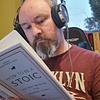Take a photo of a barcode or cover
An interesting book! Although the title is somewhat misleading. When thinking about silk roads I thought there would be a focus on the relations between Europe, China, India and Central Asia and this was the case in the book up until 1000 AD. Unfortunately, the author abandoned this approach after a third of the book (reaching aprox. 1000 AD) and then it went on to a focus on Central Asia and Europe, with smaller extensions to the Americas. I would´ve loved to see the initial approach throughout the book, but that was not the case. From 1000 onwards India and China leave the scene almost completely and we read a lot about England, France etc.
Still, the book was thoroughly researched and well presented, but an continuous inclusion of the other countries would have been so much more interesting!
Still, the book was thoroughly researched and well presented, but an continuous inclusion of the other countries would have been so much more interesting!
challenging
dark
informative
mysterious
slow-paced
Definitely epic in scale. This is an attempt to trace the history of the silk roads of antiquity into modern times. It makes the argument that much of modern international politics can be seen through the lens of attempts to control this region.
There is fundamentally an argument about control and pride.
It is slow going. Approach with caution.
There is fundamentally an argument about control and pride.
It is slow going. Approach with caution.
I evidently had started reading this book several years ago and got as far as the Mongols. And then I picked it up off the shelf the other day and thought I'd take a look. And, it is fantastic. Most of it is history I've known about but with a twist that is certainly thought provoking. And the ending, given the pandemic and the the invasion of Ukraine by Russia, and so many other things, seems positively prophetic.
A highly readable overview, this is not an depth study of any event. Rather, it is tell the broad sweep of history and how this area has always been the crossroads of the world.
A highly readable overview, this is not an depth study of any event. Rather, it is tell the broad sweep of history and how this area has always been the crossroads of the world.
challenging
informative
slow-paced
Good, but was less focused on the east than I'd expected - much more about the west and how it's affected by the east. Plus more of the author's bias came through than I'd prefer
Lastly, I really hate audiobook narrators doing accents for quotes, but this seems ubiquitous
Lastly, I really hate audiobook narrators doing accents for quotes, but this seems ubiquitous
I really don't know what the point of this is. It begins with plentiful and coherent details about, mostly, ancient and mediaeval Central Asia - particularly strong on religious subjects like the Crusades - and then we rattle through the (selected) whole of world history, and I cannot begin to see why we need for example a long screed of ordinary, well-known, not particularly deep and extremely dull stuff about for instance WW2. In the last chapter with its breathless dash round the current promise of Central Asia, we perhaps get to the point (Central Asia had always (or maybe often) been at the heart of world affairs and will be again), but the Silk Road conceit is often lost and (as the subtitle does point out) this is a history of the world, not of the actual Silk Roads
Rather carelessly read, in my audio copy, by an actor who mercifully left off doing his panto villain voices when it came to quoting Hitler.
Rather carelessly read, in my audio copy, by an actor who mercifully left off doing his panto villain voices when it came to quoting Hitler.
Just a little bit long but definitely necessary reading. Along with the Talebs of the world helped me refocus, examine some elements of my cultural identity and revaluate how this planet got here and where it is going next.
For the impatient read the conclusion.
For the impatient read the conclusion.
challenging
informative
reflective
slow-paced
adventurous
informative
inspiring
reflective
I loved this book and found it at times very difficult to put down. The middle section was a bit laborious but towards the end and our modern times I really enjoyed.
Peter gives a very consise history of the world from the early abrahamatic religions to 9/11 and how different people, culture, religions and raw resources have shaped the world we live in today and how we got here.
Well worth a read if you have a week or two and have an interest in our shared history.
Peter gives a very consise history of the world from the early abrahamatic religions to 9/11 and how different people, culture, religions and raw resources have shaped the world we live in today and how we got here.
Well worth a read if you have a week or two and have an interest in our shared history.
informative
medium-paced



